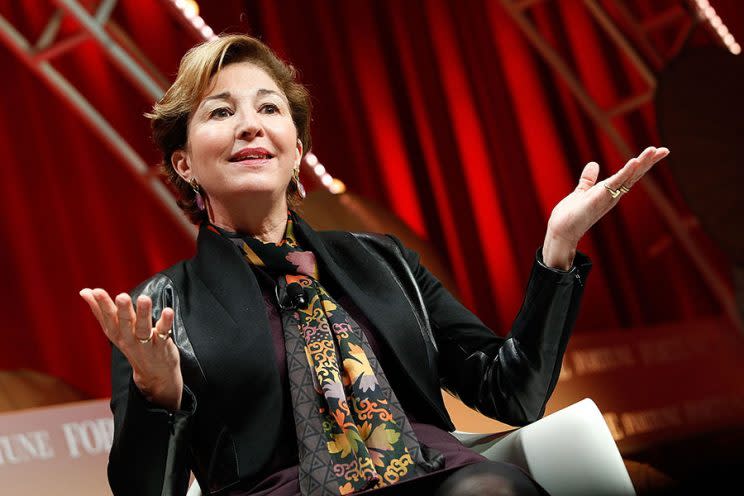Anne-Marie Slaughter Is Back With More Controversial Opinions

When Anne-Marie Slaughter talks, people listen. And this time she’s talking about parental leave — but not in the way that some might expect.
Speaking out on the topic during a book-tour stop in the London — where British policy assures new moms a full year of paid leave — she did not fawn over the generous law.
“My ideal would be the woman takes six months and the man takes six, and they divide that however they want,” she told the Times. “Both parents need to bond with the child, and both parents need to understand what it takes to be parents and to be workers. You can really fall behind in a year. It’s too long out of the workplace.”
Slaughter, the former dean of Princeton University’s Woodrow Wilson School of Public and International Affairs and former director of policy planning for Secretary of State Hillary Clinton, caused a firestorm in 2012 with a piece in the Atlantic, “Why Women Still Can’t Have It All.” That article went viral but was misconstrued, as evidenced by the fact that its author was still explaining what she meant during her recent London visit to promote The Chessboard and the Web.
“Actually, what I was saying is we still can’t have it all because we haven’t made enough changes,” she said. “The message was, ‘Here are the changes we need to make,’ whereas many people interpreted me as saying, ‘Women should just accept that they’re never going to be equal.’ No! Not in the least. Of course women can be equal, but only if men are more equal in the area of traditional women’s work.” It’s why she’s advocating not maternity leave but paid-care leave for men and women, including caregivers tending not only to babies but to parents as well.
“In the U.S. we are now talking about paid family leave and childcare, but we’re not talking about them as women’s issues as much as we used to,” Slaughter continued. “We’re talking about them as family issues. So I think we have made progress, but there is still a long way to go. This idea that breadwinning is for both genders, but caregiving is still only for one, is going to be very stubborn.” (Slaughter also admitted in the interview that she “absolutely” had regrets about leaving her job with Clinton after two years to tend to her family. “It was my dream job. I would have loved to have been on the front lines negotiating with Iran or at the U.N., but on the other hand there are trade-offs in life,” she said.)
Regarding the length of time for parental leave — whether for moms only or moms and dads both — there is great variation around the globe. Compared with the U.K.’s 52 weeks, the U.S. offering of 12 unpaid weeks of leave through the Family and Medical Leave Act is dismal, making it the only competitive country in the world not to guarantee paid maternity leave. Just some of the countries outpacing our national offerings include Norway, Canada, and Sweden, which provide at least 26 weeks of paid leave; and South Korea, Japan, the Czech Republic, Austria, and Denmark, which offer 52 or more weeks of paid leave to mothers.
The U.N.-affiliated International Labor Organization suggests at least 14 weeks of paid maternal leave. But what’s considered ideal when both labor-force realities and the science behind child development are taken into account? According to Patty Cole, head of governmental relations for the nonpartisan, research-based nonprofit Zero to Three, it’s about the same, as three months is considered the minimum amount of time that’s needed for a parent to connect with a baby during the crucial early-development phase. It’s also a good amount of time when it comes to supporting a mom in her efforts to breastfeed.
And is a year too long, at least when it comes strictly to what’s good for mom and baby? “There’s not a consistent opinion on the upper end,” Cole says. “As long as parents want, is what we would say.”
“We know it takes months of focused attention for a parent to learn to read baby’s cues and for the parent and baby to get used to each other,” Cole explains, stressing the importance of both parents having early bonding time (no matter what gender or configuration). “Babies are really wired to developed these relationships for survival — they get to know the voice, the smell, the face of a caregiver, and to become a more settled baby. They establish a predictability — ‘If I do this, I know you’ll meet my needs and I’ll feel secure.'”
The bottom line, she says, is that “it’s really about allowing parents and babies to have time together — especially parents who can’t afford unpaid leave,” as most currently fall into that category.
As for Slaughter’s opinion that getting a year of paid leave comes with the downfall of being out of the workforce for too long? That’s a personal judgment call to make. But Cole adds: “Parents do an important job for the rest of society because those early connections foster babies’ ability to learn and be successful in jobs and in life. So it’s something we’ll all reap the benefits of.”
Read more in Yahoo Style + Beauty:
• Neil Gorsuch Questioned About Maternity Leave Comments in Confirmation Hearings
• ‘Five Months After Coming Back to Work, I Left a Job I Previously Loved’
• Former Ivanka Trump Executive Had to Fight ‘Long and Hard’ for Maternity Leave
Follow us on Instagram, Facebook, and Pinterest for nonstop inspiration delivered fresh to your feed, every day. For Twitter updates, follow @YahooStyle and @YahooBeauty.


